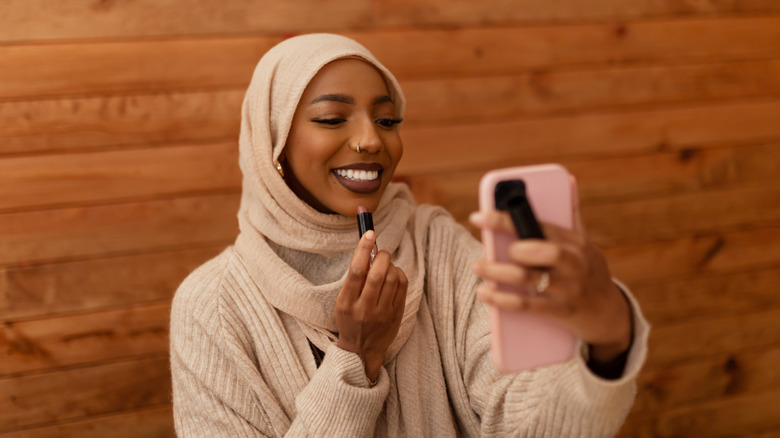Halal Beauty: What Is It And Why Is It So Important?
When makeup and wellness are a part of your everyday life, products that reflect all facets of who you are, beyond your age or skin tone, can be essential. More and more, consumers are looking for items that reflect their beliefs, such as sustainable sourcing, vegan ingredients, or cruelty-free production. And now, this same perspective is being applied to halal beauty products, which are products that have been formulated to align with particular Islamic laws or practices.
The term "halal," which translates to "permissible" or "lawful" in English, is most often used when referring to food and drinks, though is better understood as a religious ethos centered around minimizing harm to oneself. It also emphasizes the humane treatment of animals. The term "haram" is used in contrast to halal, and translates to "unlawful" in English.
When it comes to beauty products, much like many other products made for consumption, it can be difficult or perhaps even impossible for the average consumer to know every detail of how each product was made from beginning to end. But for Muslims and others who are working toward achieving best halal practices, it is non-negotiable to know that products they're using conform to the laws of the faith, both in their ingredients and in the methods of creation. This ensures that one does not consume an ingredient or engage with a practice that would be considered haram on accident.
What makes a cosmetic product halal?
Like food products, any cosmetic can be halal-certified. Per its website, The American Halal Foundation declares that it, "evaluates, inspects, and monitors the various elements of production and every raw material to ensure compliance with the international halal standards." Criteria includes ensuring that products are not made with certain animal products, including those derived from pigs or insects; that the product is cruelty-free and excludes ethanol, among other ingredients. The product should also be free of harmful chemicals, such as pthalates, parabens, sulfates, and formaldehyde.
According to a 2019 paper published in Cosmetics, "Cosmetic ingredients derived from animals such as gelatin, lecithin, glycerol, fatty acids, and collagen are very difficult to verify as halal. Some coloring agents may be derived from insects, hence qualified as haram." The paper also emphasizes that all spaces associated with the product and its distribution must be proven hygienic, or free from "najis," (which translates to filth in English). "In the preparation, processing, manufacturing, storage, and transport of halal cosmetic products, maintenance of hygiene and pure conditions must be ensured at all times," it reads.
Cosmetics must also be suitable for performing "wudu," which is the step before prayer in which the face, hands, arms, and feet must be washed. Should cosmetics not be water permeable, they would not be suitable for this step. Claudia Nour, founder of Claudia Nour cosmetics, demonstrates in a YouTube video how she swatches and tests makeup to ensure it is compatible with performing wudu.
The significance of halal beauty
According to the aforementioned paper, the market for halal cosmetics is growing rapidly. Minara El-Rahman, founder of Mora Cosmetics, described in a TikTok video that her halal makeup brand was created to promote inclusivity in the beauty space. "I'm just tired of women wearing scarves being targeted as models for brands but not necessarily being thought of as the core customer, and what our thoughts and needs are as the consumer," she said.
In the same video, El-Rahman also pointed out that halal-beauty is not just for Muslims — everybody can use halal cosmetics, regardless of faith. Because of the high standards of cleanliness, emphasis on cruelty-free products, and ingredient traceability that being halal-certified requires, many consumers can appreciate the potential for high-quality products as a result. This is especially the case as the untold truth of clean beauty is that it continues to lack in both standards and brand transparency. As halal cosmetics continue to grow, so does the demand for other products like halal nail polish, and brands with ethical integrity.
Keep in mind, however, that halal is not synonymous with vegan, although many halal products could be considered vegan. Frequently used animal-derived ingredients such as beeswax and lanolin obtained from sheep's wool are still considered halal, as long as animals were not harmed in securing the ingredients. Products that are certified halal will typically feature a logo, just as the Leaping Bunny logo denotes a product is cruelty-free.
